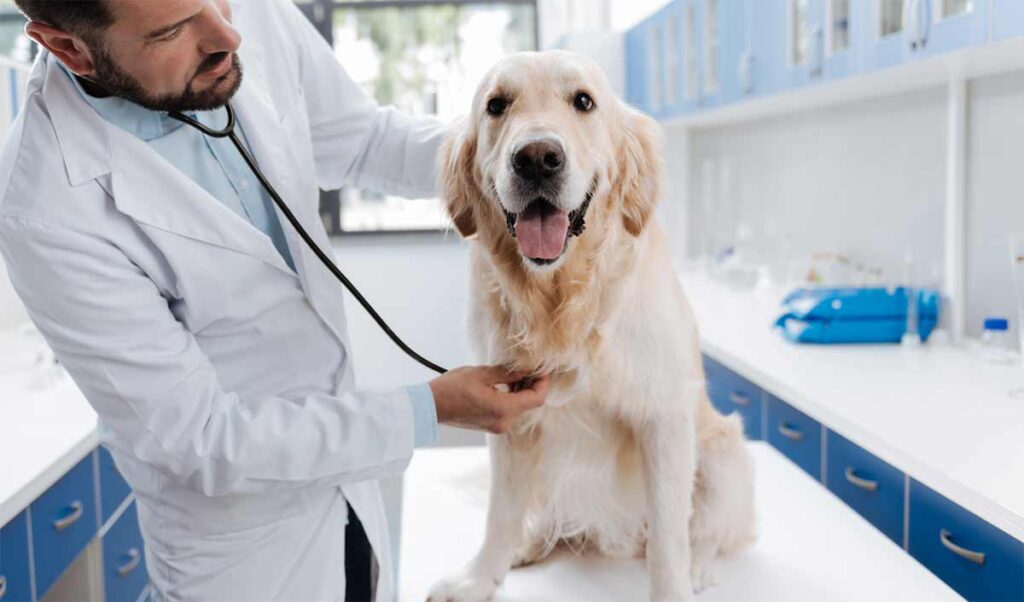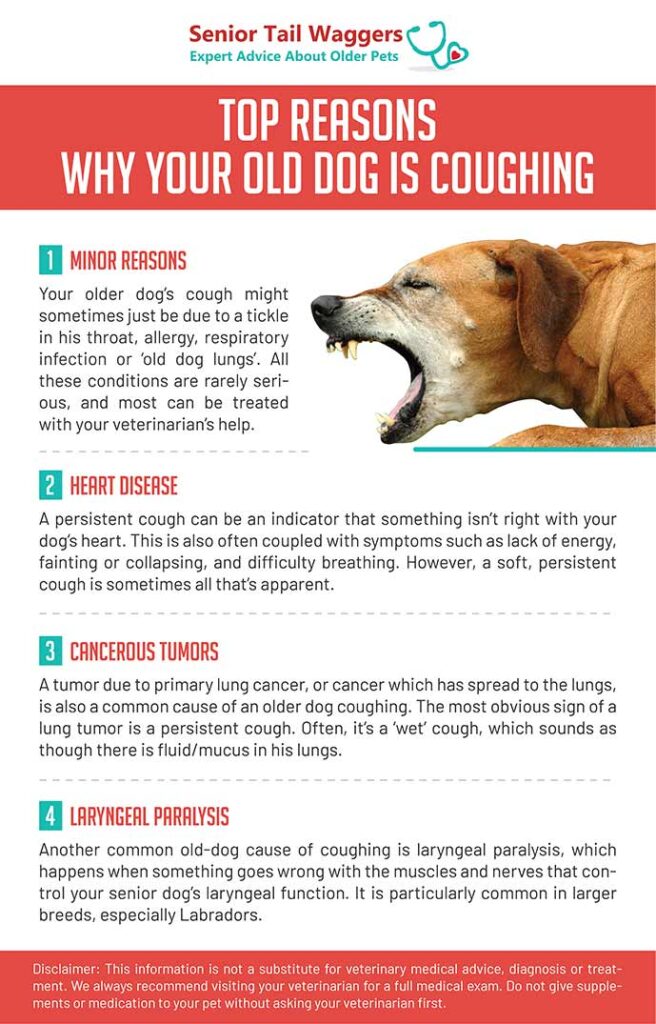This article was updated on May 1st, 2023

If your old/senior dog is coughing or gagging, we can help you understand why and what you can do about it.
Is it the sort of cough that lingers or seems chronic? If so, it could be a sign that there’s something serious going on ‘behind the scenes’. Of course, there are all sorts of reasons why an older dog might cough, and many of them are not a cause for concern. But in older dogs, coughing can also be a serious sign that not all is well. Since coughing is a common symptom of several serious medical conditions that can affect senior dogs, it is important to understand why your old dog is coughing or gagging.
In this article, we will review the top 5 reasons that cause old dogs to cough, explain when coughing is serious enough to see your vet, and finally review the 8 best home remedies to help your coughing dog.
You can also answer 2 questions below to get personalized information – based on your dog’s situation.
Tell Us More About Your Senior Dog’s Coughing:
Simply answer the two questions below to get personalized recommendations from our veterinarians:
Top 5 Reasons That Cause Old Dogs to Cough or Gag
Unfortunately, older dogs are more likely to develop health issues. Some will be minor, and others more serious. Let’s first look at the minor reasons:

1. Minor Reasons
Your older dog’s cough might just be due to a tickle in his throat, allergies, a respiratory infection or “old dog lungs.” The latter is a normal, age-related change that results in the lungs becoming less elastic and more fibrous, which in turn causes them to be less pliable when the dog is breathing in and out. However, all these conditions are rarely serious, and most can be treated or managed by your veterinarian.
But even though coughing is sometimes no need for concern, it can also be a result of a serious ailment. Therefore, it’s important to take your senior dog to the vet if the coughing is persistent or forceful, or if your dog is experiencing breathing difficulties or other symptoms.
Of the three serious conditions mentioned below, heart disease is the most common in senior dogs, and the longer it is overlooked, the worse the prognosis. Don’t hesitate to contact your veterinarian to check over your golden oldie and determine the cause of their cough.
2. Heart Disease
Dogs don’t have heart attacks the way we humans do, and the signs of canine heart problems are quite varied, and sometimes very subtle.
A persistent cough is just one of them, but it’s a good indicator that something isn’t right with your dog’s heart. This is also often coupled with symptoms such as lack of energy, fainting or collapsing, and difficulty breathing. However, sometimes, a soft, persistent cough is all that’s apparent.
Coughing, especially after exercise or when lying down or waking up, is a common symptom of congestive heart failure in dogs. This is when the heart is no longer pumping effectively, resulting in fluid buildup in the lungs. It is a common reason for coughing in older dogs.
However, coughing can also be a result of an enlarged heart. Just above the heart sits a cluster of cough receptors at an anatomical site called the bronchial bifurcation (which is just a scientific name for where the bronchi split to go to each lung). The heart pressing on this area can also result in coughing.
Heart failure in smaller, older dogs is most often the end result of mitral valve disease. This is a condition where a valve in the heart does not close effectively. Due to this, some blood is forced backward when the heart pumps, meaning the heart has to work extra hard to still pump the same amount of blood as before.
Other causes of heart failure, particularly in larger breed dogs, include dilated cardiomyopathy, chordae tendinae rupture, and causes of arrhythmias, such as an atrioventricular block. Congenital heart diseases also occur, and often become apparent at younger stages of life.
It’s important to consider that non-structural heart conditions can also lead to heart failure. These can happen at any age, and include cancer, pericardial infections, pericardial effusion, and heartworm.
Damage from a heartworm infestation can cause your dog many of the same symptoms.
If your older dog’s coughing as well as showing other signs of heart problems (and he isn’t taking a monthly heart preventative) then your vet will want to rule out heartworm as the cause of the problem.
Over time, the extra workload that this puts on the heart muscles, causes your dog’s heart to become enlarged as the muscle walls thicken.
This can put pressure on the trachea. It’s the combination of these two things that can produce chronic cough that senior dogs with heart disease sometimes develop.
A dog heart-failure-induced cough might sound ‘dry’ or ‘hacking’ … sort of like a ‘barking cough’.
Or it could be ‘wet’… this means it sounds like there is mucus or fluid in his chest, causing your old dog to gag a little too.
A lot depends on the stage the heart problems have reached and what’s going on inside your older dog’s chest.
Although there’s no ‘cure’ for heart failure, it can often be ‘managed’ with medication that reduce symptoms and improves your dog’s quality of life.
Heart medications may help the underlying problem, but they often don’t do much to alleviate a cough.
But, PawHealer Hound Honey Heart Syrup just might. This is an all-natural cough suppressant formulated specifically for dogs who have a heart-related cough and are on heart medication.
It’s for the cough only, not the underlying heart condition, but it can make your senior dog feel much more comfortable, sleep better, and reduces gagging and wheezing too. Please note: this is a symptomatic treatment only, and you should still seek veterinary attention to treat the heart condition. Remember to tell your vet about other medications your dog is taking, as well as their diet, as this can influence the treatments prescribed.
3. Cancerous Tumors
A tumor due to primary lung cancer, or cancer that has spread to the lungs, is also a common cause of older dog coughing.
Dogs don’t smoke, but if their owners do, then they’re at as much risk of second-hand smoke as the rest of us are!
If you live in a big city, where there’s a lot of traffic or pollution, this can also cause lung problems for your dog, including lung cancer.
Tumors in your dog’s lung/s could also be secondary tumors… which means that they’ve been ‘seeded’ from the original tumor, which could be in another part of his body.
In senior dogs, secondary tumors are the most common kind, but primary lung cancer can also happen.
The most obvious sign of a lung tumor is a persistent cough. Often, it’s a ‘wet’ cough, which sounds as though there is fluid/mucus in his lungs.
A common tumor in large breed older dogs is a bone tumor. This is known as osteosarcoma. It very quickly spreads to the lungs, and as well as coughing, you are likely to notice lameness as well.
It is important to consult your veterinarian to diagnose whether your dog has cancer early on. The earlier in the disease process your dog receives treatment, the better his prognosis will be.
Depending on what he finds, your vet may be able to completely remove the tumor, and he may recommend other additional treatments depending on how advanced (or widespread) the cancer is. Veterinary treatments in the cancer field are now very advanced, and so even though cancer can be a distressing diagnosis, there are often many options to treat it and keep your dog’s quality of life good for as long as possible.
4. Laryngeal Paralysis
Another common old-dog cause of coughing is laryngeal paralysis, which happens when something goes wrong with the muscles and nerves that control your senior dog’s laryngeal function. It is particularly common in larger breeds, especially Labradors.
The larynx is the structure at the back of your dog’s (and your) throat, which helps to keep the airways open.
It’s a partial paralysis and Fido can still breathe, but they can’t move as much air as normal through their larynx and into their lungs.
This can make him cough or gag, especially when he’s eating, excited, or exercising. He may seem to have trouble breathing, pant a lot, gasp, or sound ‘wheezy.’
Symptoms tend to appear gradually over a period, and the earlier you achieve a diagnosis, the simpler and more effective the treatment.
If your older dog is showing any of these symptoms, and especially if their bark sounds different (hoarse, lower pitched, or just ‘rough’) too, he could have laryngeal paralysis.
If this cause of old dog coughing isn’t recognized and treated early, it can worsen until you have an emergency where your dog can’t breathe due to exacerbation and inflammation of the larynx.
Don’t take a wait-and-see attitude here!
Your veterinarian will use a few different tests to confirm a diagnosis and determine what’s causing the paralysis. This might involve sedating your dog to visualize the larynx and intubating it if they are struggling to breathe.
Depending on the results of those tests and how severe your older dog’s symptoms are, a treatment plan will be put in place.
There are several surgical options, and which one is best for your dog can only be decided by a veterinarian.
But it’s up to you to make sure that you discuss all options with your vet so that you know what route they are going to take and what the prognosis is.
5. Collapsing Trachea
Collapsing trachea is very common in small breed dogs who have small tracheas and less rigid tracheal ring cartilage. Episodes of tracheal collapse may be triggered by excitement, exercise, eating and drinking, or allergens in the air such as pollen and smoke. When the dog inhales deeply, the trachea collapses and causes the dog to cough and gag.
-A collapsing trachea can often be seen on chest x-rays.
-Treating a collapsing trachea involves weight loss, anti-inflammatories, allergy medications, and other medications as necessary. Keeping the dog thin and away from irritants will also help.
Other Reasons An Old Dog Might Cough
There are other conditions and diseases that cause a dog (of any age) to cough.

They include:
- Heartworm
- Upper Respiratory Infection
- Pneumonia
- Kennel Cough
- Distemper
- Asthma
- Foreign body stuck in throat or esophagus
- Acid reflux
- Valley Fever (a fungal infection)
- Allergies
Let’s now review home remedies and veterinary treatment options.
8 Best Home Remedies To Help Your Coughing Dog
Our veterinarian Dr. Debra Eldredge – author of the best-selling book “Dog Owner’s Home Veterinary Handbook” – has compiled for us a list of the most effective home remedies to help coughing dogs:
1. Start with Simple Home Care: If your dog has discharge from his eyes or his nose, use a warm compress to soften the crusts and clean gently. A dab of vitamin E (puncture a capsule with a pin and squeeze out a drop) can help with a sore nose. Artificial tears drops or ointment can be safely applied to their eyes.
2. Use a Humidifier or Steam: Excessively dry air can cause coughing in dogs. If you have a humidifier, encourage your dog to rest in that area.
3. Use a Teaspoon of Honey: People also often reach for honey when they have a cough. A teaspoon of honey in a cup of warm water may ease a short throat. This is not recommended for puppies (think about infant cautions) or for dogs with diabetes, as it can interfere with glucose regulation.
4. Consider Limiting Physical Activity in Cold Weather: Very cold, dry air outside can stimulate coughing as well as dry air inside. Senior dogs don’t handle extreme cold well. Keep walks short and limited.
5. Use a Non-Restrictive Harness Instead of a Collar: Be sure that you use a non-restrictive harness for walks. Do not walk your dog on a collar. The pressure on the trachea can stimulate more coughing.
6. Give your Dog a Quiet Place to Rest: Coughing can be exhausting. Make sure your dog has a quiet place to rest, away from active children or other pets.
7. Increase Hydration: It is important to support your dog’s hydration when they have a cough: coughing can increase his normal hydration needs. If your dog is not drinking enough water, consider trying homemade chicken soup, low or no sodium bouillon, or adding some juice from tuna canned in water or other meat juice flavoring (plain) to their water.
8. Over-the-Counter Cough Medication: Dextromethorphan is a common ingredient in human OTC cough medications such as Robitussin. It can be helpful for some dogs short term. This is an “off label” medication, so you should check with your veterinarian about use in your individual dog. It is not recommended for dogs with liver problems or for dogs on a number of medications.
Continue reading: 8 Best Home Remedies to Help a Coughing Dog (Vet Advice).
Important note: the home remedies mentioned here are only supportive ideas to help your dog with symptoms – they are not likely to help with the root cause. A visit to your veterinarian is important to help understand the root cause and define an effective treatment plan. Putting off a veterinary visit could endanger your dog if he has a serious underlying cause for the cough.
Natural Cough Medicine Can Help in Milder Cases
Obviously, it’s vital to have your golden oldie checked out by your veterinarian to make sure that you know why they are coughing or gagging and get any medication or treatment started as soon as possible. But, once you’ve got all that in place, one of these natural cough preparations may be just what you need to soothe an irritated trachea, help with the symptoms of kennel cough, and generally reduce coughing episodes.
Obviously, it’s vital to have your golden oldie checked out by your veterinarian to make sure that you know why he’s coughing or gagging and get any medication or treatment started as soon as possible. But, once you’ve got all that in place, one of these natural cough preparations may be just what you need to soothe an irritated trachea, help with the symptoms of kennel cough, and generally reduce coughing episodes.
PawHealer has a range of natural herbal cough medicines formulated for dogs, and for different types of coughs.
There are many natural cough remedies on the market, and while they may soothe a tickle in the throat, it’s important to determine the underlying cause of the cough first with the help of your veterinarian.
PawHealer syrup for Kennel Cough:
No products found.
For collapsed trachea & more:
- Symptoms of Honking Type Cough
For gag/hack/wheeze:
- Symptoms of Excess Honking Cough
After all, if your dog is happier, you will be happier too!
When Is Coughing Serious Enough to See Your Vet?
You might be wondering if your dog’s cough or gagging is serious enough to justify a visit to your veterinarian.
It can be hard to know as an owner when a cough is serious enough to warrant veterinary attention. A dog may occasionally cough to clear their throat or if something irritates them. That’s usually not a cause for concern. However if a cough becomes persistent, lasts more than 2 days, or becomes more frequent or severe, then veterinary attention is required. A cough is always serious if it comes with breathing diffiulties, if your dog is generally unwell in themselves or if they are coughing up large amounts of phlem or blood.
As a general rule, if your dog is still bright in themselves and eating and drinking as normal it may be okay to just monitor their cough, as long as it isn’t happening too frequently. Since coughing can be a symptom of a serious ailment, it’s important to be cautious and take your dog to the veterinarian if you are unsure about what to do.
It’s important to be prepared for the basic questions your vet will want to ask about your old dog’s coughing or gagging. Being able to answer your vet’s questions will help improve diagnosis and ultimately solve the issue faster for your canine friend. Questions may include:
- How can you describe the cough? (choking, gagging, retching, gasping or throat clearing noise, etc?) – it may not even be a cough at all!
- How frequent is the cough? Is coughing on a daily basis, several times per day?
- How long has coughing been going on?
- Are there any other symptoms associated with the cough such as breathing issues?
- Is the cough productive – i.e. does your dog bring anything up when they cough?
- Does the cough appear to come more from the throat or chest?
- Does anything trigger the cough? Or does it happen in a specific environment?
How Will Your Vet Diagnose the Issue?
Your vet will start by taking a thorough history (see how to prepare for the visit below) and by performing a physical examination on your dog. They will pay particular attention to any abnormal heart or breathing sounds, the heart rate and rhythm and your dogs temperature. By using all of this information, they will then decide the best next course of action.
Sometimes your vet may opt to start a trial treatment plan and base the diagnosis on the response to medication. For example, in the case of kennel cough often anti-inflammatory medication is all that is required and if your dog responds well then its likely kennel cough was the cause.
However, if a heart murmur or abnormal heart rhythm is detected then a heart ultrasound scan and X-rays might be the next step. This will help evaluate whether or not your dog’s heart has signs of congestive heart failure such as thickening of the heart walls, inefficient heart valves or fluid build up within the lungs.
X-rays are a key tool in evaluating any dog that has developed a persistent cough. By taking an X-ray of your dogs chest and lungs, vets will be able to visualise the distribution of air within the lungs. A healthy dogs lungs should appear dark on an X-ray as they are full of air; the presence of any lighter coloured areas may indicate thickening within the lungs or even fluid build up. There are many different ‘lung patterns’ that can be identified on an X-ray that can point towards a specific diagnosis.
In some cases your vet may want to perform a ‘broncho-alveolar lavage’, this involves inserting a small volume of sterile fluid into your dogs lungs and then aspirating it back out. The idea is that by sucking that fluid back out the vet will also gain a sample of the types of cells or even bacteria present in the lungs, further helping reach a diagnosis.
Find Out Why Your Old Dog is Coughing: Answer Our Veterinarian Quiz Below
Simply start by answering these questions below to get personalized recommendations from our veterinarian team:
Infographic: Top reasons why your old dog is coughing
The infographic below summarizes the top 4 reasons causing older dogs to cough repeatedly. We are now also going to review other reasons older dogs might cough, and, most importantly, we will discuss when you should be concerned and see your vet, and what you can do to help.

FAQ About Dog Coughing
What if my dog is only coughing in the morning?
The time of day that your dog is coughing and the frequency and help determine what is going on. Some dogs will just cough during the morning, some just at night and others will cough all the time. If your dog is coughing in the morning, there are some important things to consider. Read our article about dogs coughing in the morning.
What if my dog is not a senior dog?
Read our article about dog coughing and answer our questions to get personalized information based on your answers.
Continue reading:
- What Causes Coughing or Gagging In Older Dogs?
- Other Reasons An Old Dog Might Cough
- When Should You See Your Vet?
- How Will Your Vet Diagnose the Issue?
- How Can You Prepare for the Visit to the Vet?
- Is there Anything You Can Do To Help Your Dog?
Disclaimer: This website's content is not a substitute for veterinary care. Always consult with your veterinarian for healthcare decisions. Read More.








After reading symptoms of dog cough/gagging in this article.I think my buddy may have this Laryngeal Paralysis.
Which doesn’t sound good
I was diagnosed with Emphysema. My symptoms included shortness of breath, dizziness, lack of oxygen to all body parts, numbness of fingers, no energy, no appetite, fatigue, and bloodshot eyes. I was living at a place that has mold and mildew in the air conditioning unit. I also smoked a pack a day for 20 years. The Pulmonologist started me on Spiriva and Advair plus nose sprays, to reduce symptoms and slow down progression but I could not tolerate them for long due to severe side effects. I decided to adopt a more natural approach and started on Emphysema Disease Natural formula from THE HERBAL GARDENS, the Emphysema natural formula immensely helped my condition, it reversed my Emphysema. My severe shortness of breath, dry cough, low energy, fatigue, chest tightness and others gradually disappeared. Visit THE HERBAL GARDENS via their official web-site ww w. Theherbalgardens. org. This Emphysema treatment has improved the quality of my life greatly, i breath much better and feel comfortable doing so. Since the procedure I enjoy walking the dog for my daily exercise. DON’T GIVE UP HOPE!!!
You’re a dog?
I know it seems rude to laugh here, but I wondered the same thing. It IS a blog about DOG health, after all. 😄
My small 16 yrs. old cockapoo was cough, hacking, gagging, took her vet., he said, give her half dose of Benadryl. I did, and guess what, she stopped all the gagging. It’s allergies! Works for my pet. Good Luck!
Can you tell me if this was liquid Benadryl?
My 14 year old cocker spaniel has had a cough for about a year now and he sometimes gags after a drink and coughs up a little water I’ve taken him to the vets and they say don’t worry about it I use the pdsa and they have been great in the past my girl cocker spaniel had this as well she passed away after having a stroke please help I am at a loss. Peter
Idk what to do my dog is an 9 year old pitbull and over the past 2 or 3 months has been coughing and he also coughs up water after drinking. I’m worried he has heart worms idk anyone help??? [email protected]
This is sick. Just saying your dogs sick and then telling you you need to buy this or else.
can i give my dog children cough syrup?
Would this be ok for a diabetic furbaby?thankyou
Please help I have no money and I have a pit bull she’s 8 and has a dry cough its only bad when she gets excited or runs I’m scared I don’t want it to be heartworms what can I do or anyone know what it could be please help
Hi Kristal,
Hi there!
Unfortunately it’s impossible to diagnose a cough just from a description, and there are lots of different possibilities as to what it could be. Even in the clinic, your vet will likely not be able to diagnose without some sort of tests – blood tests and x-rays are likely to be needed.
I would recommend looking into care credit or borrowing money from family or friends in order to get her seen, as the sooner she is treated the better her outcome is going to be. You should also be upfront with your vet about what you can afford – we’re used to working with different budgets and will be able to offer options so that we can find the best for you and your dog. For instance, based on the exam your vet might recommend you trial a treatment rather than do the x-rays, or they may recommend x-rays instead of blood tests, or vice versa. They’ll talk you through all the costs as they go, but they can’t help you if they don’t know your concerns.
I hope that helps – I really would get her seen sooner rather than later!
Dr Joanna Woodnutt BVM BVS MRCVS – veterinarian
PS: The info on our website is not a substitute for the professional in-person advice that your local veterinarian can provide.
I have a poodle mix, he is 13 years old .. I had to take him after my sister passed away in April of this year .. he has been coughing really bad and he gags after He drinks water .. my sister’s wish was for me to take him if anything ever happened to her .. I’m jobless and have no money at all to take him to the vet .. can someone please tell me something I can do to help him with the coughing,and gaging .. I need help !!! Thank you